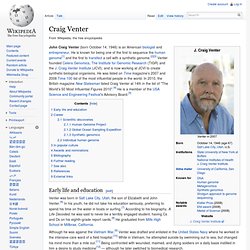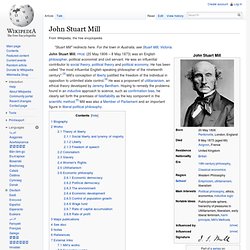

Steve Keen. Steve Keen (born 28 March 1953) is a former professor in economics and finance who taught at the University of Western Sydney.

He considers himself a post-Keynesian, criticizing neoclassical economics as inconsistent, unscientific and empirically unsupported. The major influences on Keen's thinking about economics include John Maynard Keynes, Hyman Minsky, Piero Sraffa, Joseph Alois Schumpeter, and François Quesnay. Craig Venter. Early life and education[edit] Venter was born in Salt Lake City, Utah, the son of Elizabeth and John Venter.[6] In his youth, he did not take his education seriously, preferring to spend his time on the water in boats or surfing.[7] According to his biography, A Life Decoded, he was said to never be a terribly engaged student, having Cs and Ds on his eighth-grade report cards.[8] He graduated from Mills High School in Millbrae, California.

Although he was against the Vietnam War,[9] Venter was drafted and enlisted in the United States Navy where he worked in the intensive-care ward of a field hospital.[10] While in Vietnam, he attempted suicide by swimming out to sea, but changed his mind more than a mile out.[11] Being confronted with wounded, maimed, and dying soldiers on a daily basis instilled in him a desire to study medicine[12] — although he later switched to biomedical research. Venter began his college career at a community college, College of San Mateo in California. John Stuart Mill. John Stuart Mill, FRSE (20 May 1806 – 8 May 1873) was an English philosopher, political economist and civil servant.

He was an influential contributor to social theory, political theory and political economy. He has been called "the most influential English-speaking philosopher of the nineteenth century".[3] Mill's conception of liberty justified the freedom of the individual in opposition to unlimited state control.[4] He was a proponent of utilitarianism, an ethical theory developed by Jeremy Bentham. Hoping to remedy the problems found in an inductive approach to science, such as confirmation bias, he clearly set forth the premises of falsifiability as the key component in the scientific method.[5] Mill was also a Member of Parliament and an important figure in liberal political philosophy.